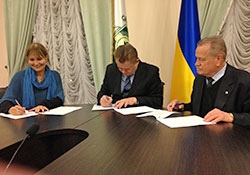Mobile clinics in Ukraine to bring health services to people in need

WHO
WHO, the Ministry of Health of Ukraine and the Ukrainian Red Cross Society have signed an agreement to establish mobile, community-based health services. From January 2015 the new network of mobile emergency primary health care units will support the fragile health care system in delivering health services for internally displaced people (IDPs), receiving communities and communities in conflict areas. According to estimates by the Office of the United Nations High Commissioner for Refugees (UNHCR), the number of IDPs in Ukraine exceeded 500 000 at the end of November.
“IDPs have poor access to health care services in the regions they have moved to, as they are not integrated into the local health care system. The new mobile clinics are a smart concept to meet the health needs of a population that is already stretched from the consequences of the conflicts. This service will benefit not only IDPs but also those people who stayed in or returned to conflict areas and host communities,” says Dr Dorit Nitzan, WHO Representative in Ukraine. “With this project WHO is supporting the government in filling critical gaps for Ukraine’s population during these difficult times.”
In the first stages of the project the mobile clinics will cover five regions in south-east Ukraine; these have the highest concentration of displaced people, containing more than 60% of registered IDPs. Health services provided by the units will serve an estimated population of over 170 000 IDPs.
Services provided by the mobile clinics
Each mobile emergency primary health care unit team includes a physician, two nurses and a driver/logistician, and is equipped with essential medical and technological equipment and pharmaceuticals. Staff in the mobile clinics have electronic tablets using advanced health information systems that provide support on protocols, follow-up and reporting. Data on demography, disease surveillance and access to care and medicines will be reported to the Ministry of Health. This will allow care quality to be standardized across a range of services including disease management and referral; maternal, newborn, child, adolescent and elderly health care; mental health; noncommunicable and communicable diseases; dentistry; gender-based violence; and injuries and trauma. It will also facilitate follow-up.
WHO’s response in Ukraine
Since the beginning of the crisis WHO has worked closely with the Government and Ministry of Health of Ukraine, coordinating and assisting with the health aspects of the humanitarian response in the field. Among other activities, WHO has supplied hospitals with kits containing basic medicines and supplies.
In addition, WHO has addressed the country’s urgent need for vaccines by providing 300 000 doses of tetanus toxoid vaccine: these are enough not only to protect those injured during the conflicts but also to provide annual coverage in Ukraine. The ongoing crisis has led to over 10 000 injuries and more than 4300 deaths. Alongside the weak and exhausted health system, the cold winter season and continued population displacement, this calls for further scaling up of humanitarian and health assistance.



